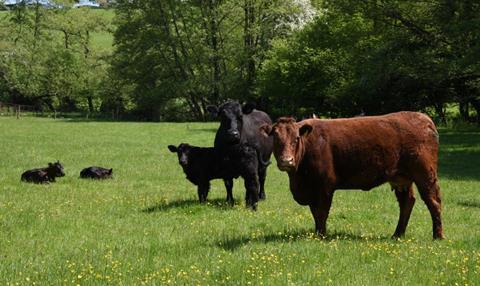Hybu Cig Cymru - Meat Promotion Wales (HCC) has announced that average livestock farm incomes in Wales are expected to fall by more than 30% in the last financial year, with averages for holdings in less favoured areas around 37% down according to the latest official projections.

The Welsh Government's Forecast of farm incomes in Wales looked at long-term trends in farm incomes and market performance, forecasting the average business income for a LFA cattle and sheep farm to have decreased by 37% on the year to £24,300 per farm.
Glesni Phillips, HCC's intelligence, analysis and business insight executive, said: "The notable year-on-year decrease for LFA farms, after three consecutive years of increases, is a result of farm business output falling by an average of 8%, combined with business costs rising by 3%.
"The report forecasts the income for a lowland cattle and sheep farm in Wales at £18,700 for 2022-23 - a 30% decrease on the previous year's figure. The figures indicate that the rise in input costs had a greater impact on lowland farms, where costs were up as much as 13% on the year. This meant the 5% increase in farm output for lowland farms was not enough to offset the rise in farm costs."
According to the HCC analysis, the period concerned - April 2022 to March 2023 - coincides with the war in Ukraine and cost-of-living concerns, both of which had "a considerable impact" on farm businesses in Wales.
Phillips said: "The data indicates that, across all farm types, which includes dairy, farm input costs rose by an average of 15% year-on-year, which has impacted on overall profitability."
HCC reflected that the challenges with increased inflationary costs have been seen across the the supply chain, with elements such as staff, utilities, fuel, insurance and business rates all impacting on business profitability. The body said that increases in the National Minimum Wage put pressure on the ability of businesses to retain staff.
Phillips continued: "Such inflationary uplifts are bound to put additional pressures onto the supply chain.
"And the sector is also continuing to face challenges from the demand side, as the cost-of-living crisis puts pressure on household expenditure and impacts on shopping habits."
Phillips said it must be remembered that volatility within the farming sector can lead to large percentage changes in farm incomes between each year and farm income averages will only provide an indication of the sector's performance, as variations will exist at farm level.
She concluded: "The level of income for a farm business can be influenced by a huge range of factors - such as physical location, economic size of the farm, production costs, whether the business is investing and the skill set of the business person."
Farmers at the heart of climate change solution
At a recent industry webinar, HCC highlighted that "farmers in Wales are at the heart of the solution when it comes to climate change", with HCC's head of sustainability and future policy Rachael Madeley-Davies stressing the "unique position" farmers are in when it comes to reducing greenhouse gas emissions and the effect this may have on farm income.
Madeley-Davies said: "We have world class renowned brands in our Welsh Lamb, Welsh Beef and Pork from Wales and they are associated with a carbon efficient way of farming and a holistic approach. Our livestock systems enhance biodiversity and the way we farm positively impacts soil health, water quality and air quality, but we now need to start evidencing those credentials with data.
"Unless you know where you are at, you’re just guessing. The current tools may not be perfect, but they give you a good indication and then we can start looking at reducing those emissions. There is a correlation between financial performance and efficiency and carbon efficiency.
"Carbon emissions usually mean wastage and indicate an imbalance between inputs and outputs. That means there are opportunities to save money and make our farming businesses more profitable as well as reducing our carbon impact, but you do need to know your baseline first.”
This story was originally published on a previous version of the Meat Management website and so there may be some missing images and formatting issues.















